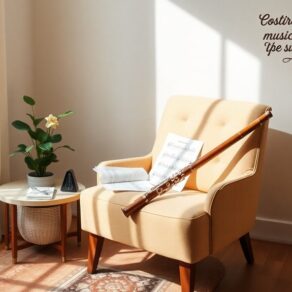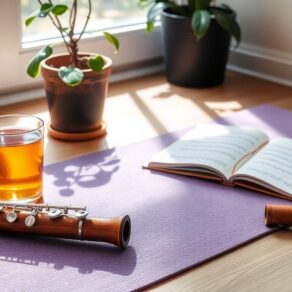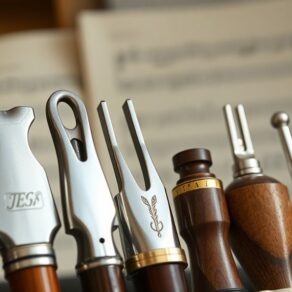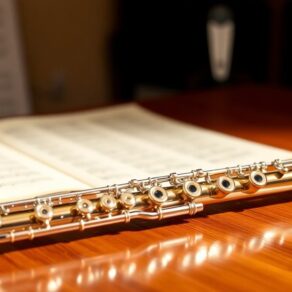You can find affordable flutes that don't skimp on quality by exploring brands like Yamaha and Gemeinhardt. The Yamaha YFL-222 is highly rated for its excellent sound and solid silver headjoint, making it perfect for beginners. Gemeinhardt models offer responsive sound and easy playability, ideal for those just starting out. For intermediate players, consider flutes with solid silver or silver-plated constructions that enhance tone. Look for features like closed-hole designs and efficient key mechanisms. Choosing the right flute is vital to your playing experience, and there's plenty more to discover about options and maintenance.
Understanding Flute Basics
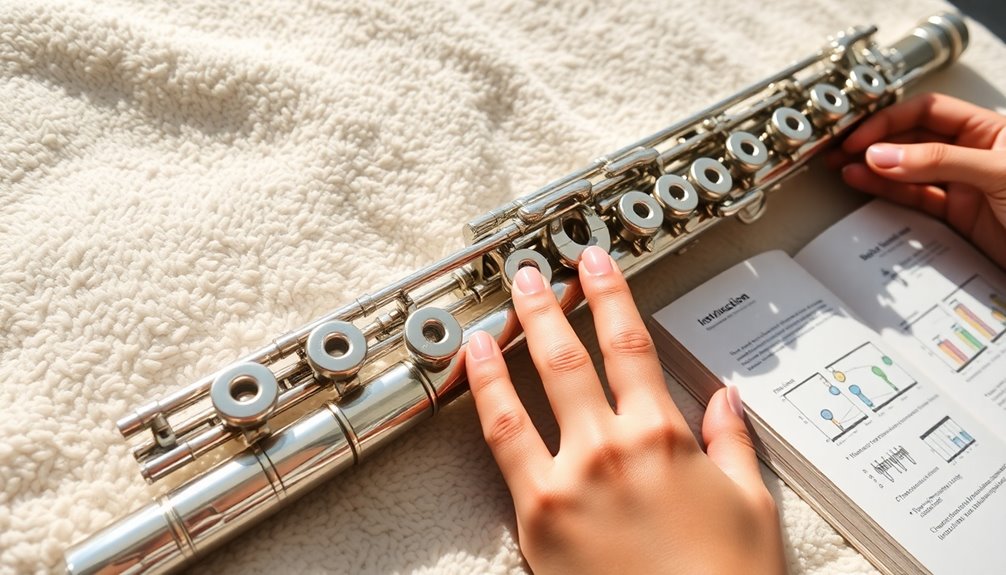
Understanding the basics of the flute is imperative for anyone considering this beautiful instrument. The flute's anatomy consists of several key components, including the headjoint, body, and foot. Each section plays a critical role in sound production, which is fundamental to your playing experience.
The headjoint contains the embouchure hole, where you direct your airflow to produce sound. When you blow across this hole, the air creates vibrations, which then travel through the flute's body. The materials used in the flute's construction can influence these vibrations and the overall tone, so it's essential to choose wisely.
As you explore the flute, you'll notice that the body is equipped with keys. These keys cover tone holes, allowing you to change the pitch by altering the length of the air column inside the instrument. Mastering the fingerings for these keys is a significant part of learning to play the flute effectively.
Understanding how sound production works in the flute is also imperative for developing your technique. You'll discover that factors like breath control, posture, and hand positioning all contribute to the quality of sound you can achieve. Investing in a quality instrument can greatly enhance your playing experience and help you avoid common beginner mistakes.
In your journey with the flute, you'll find that grasping these basics not only enhances your playing but also fosters a deeper connection to the music. Embrace this foundational knowledge, and you'll be well on your way to becoming a confident flutist.
Key Features of Quality Flutes
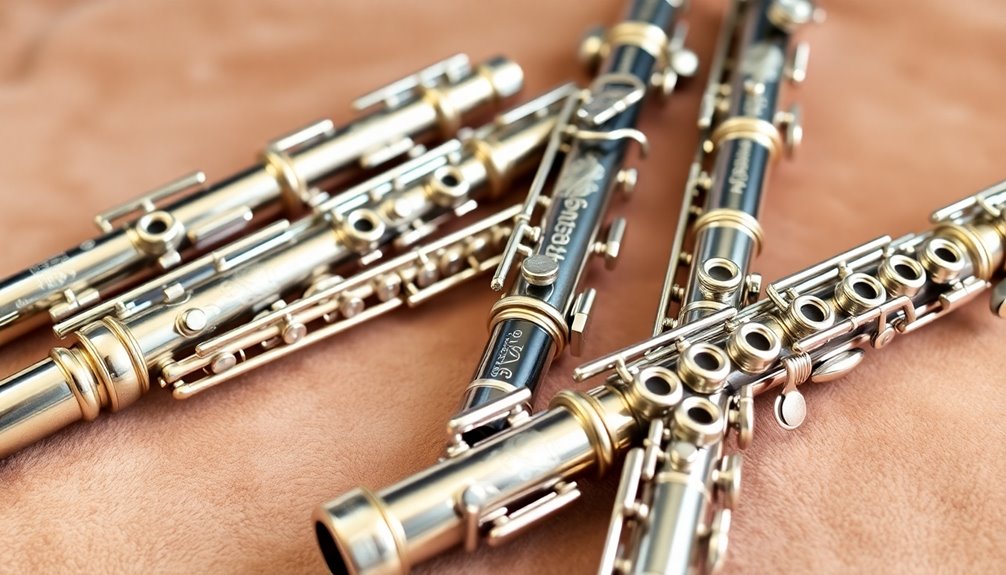
When you're in the market for a quality flute, several key features can greatly impact your playing experience. Understanding these aspects can help you choose an instrument that not only fits your budget but also elevates your musical journey.
- Material Selection: The material of the flute affects both its durability and tone quality. Most quality flutes are made from silver, which contributes to a rich, warm sound. Some beginner models may use nickel or plated materials, which can also be acceptable but may lack the depth of sound produced by precious metals. Additionally, consider flutes made from high-grade stainless steel, as these materials ensure both durability and a pleasing tone.
- Tone Quality: A flute's tone quality is essential for producing beautiful music. Look for flutes that have a clear, resonant sound across all registers. Instruments with solid silver head joints often provide a more focused tone and better projection.
- Key Mechanism: A well-designed key mechanism guarantees smooth operation and accurate intonation. Look for flutes with precision-cut pads and well-aligned keys for a more responsive feel.
- Foot Joint Options: Consider whether you prefer a straight or curved foot joint. This choice can affect your comfort and playability, especially for younger players or those with smaller hands.
Top Affordable Flute Brands
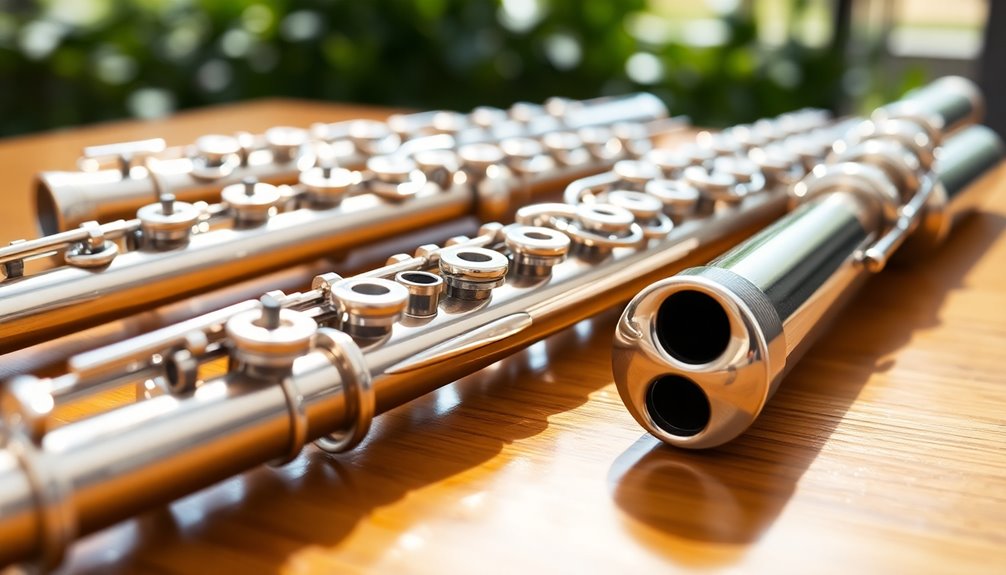
Many musicians frequently seek out affordable flute brands that don't compromise on quality. When you're on the hunt for a reliable instrument, two names often rise to the top: Yamaha and Gemeinhardt.
Yamaha flutes are renowned for their consistent craftsmanship and excellent sound quality. The company has a long-standing reputation for producing instruments that cater to both beginners and advanced players. Their flutes typically feature a silver-plated finish, which not only enhances durability but also contributes to a warm, rich tone. The Yamaha YFL-222, for instance, is specifically designed to provide enhanced playability while accommodating various musical styles.
You'll find models that are lightweight and easy to handle, making them perfect for extended practice sessions.
On the other hand, Gemeinhardt flutes are also a solid choice for those looking to balance quality and affordability. Known for their easy playability, Gemeinhardt flutes often come with a variety of options, including different key configurations.
Their craftsmanship guarantees a responsive and clear sound, which is especially beneficial for beginners honing their skills. Additionally, Gemeinhardt offers flutes with a range of finishes and materials, allowing you to find one that suits your personal style.
Both Yamaha and Gemeinhardt flutes demonstrate that you don't have to break the bank to own an instrument that sounds great and feels good to play.
Recommended Beginner Flutes
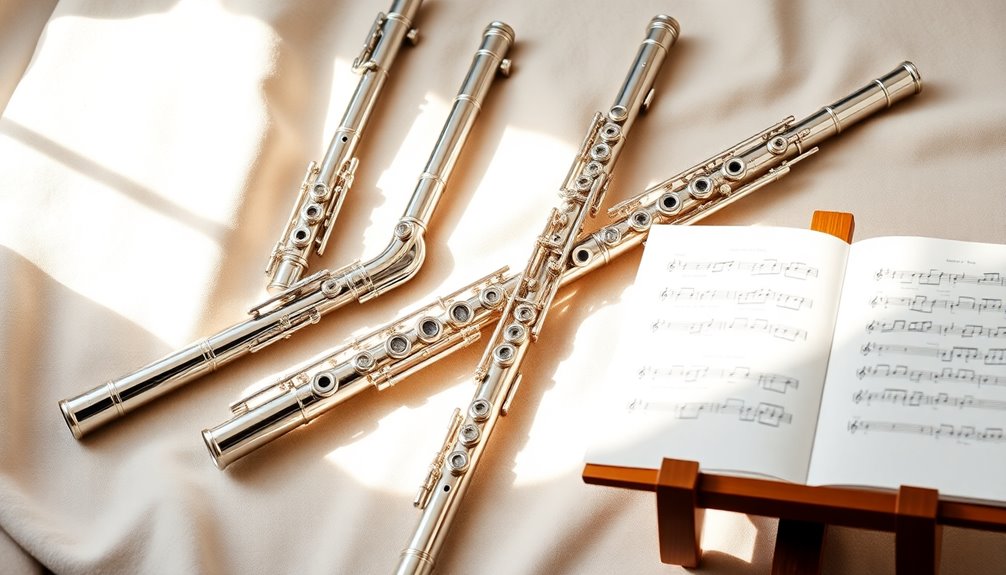
Finding the right flute as a beginner can greatly influence your learning experience. Choosing the right instrument helps you develop essential flute playing techniques and builds your confidence.
Here are four recommended beginner flutes that won't break the bank:
- Yamaha YFL-222: This model is often praised for its excellent sound quality and durability. It features a solid silver headjoint, which enhances your tone and makes it easier to produce clear notes.
- Gemeinhardt 2SP: Known for its reliable construction, the 2SP is a favorite among educators. Its easy response allows beginners to focus on mastering flute playing techniques without frustration.
- Pearl 505: This flute stands out for its beautiful design and smooth action. The low-friction pads contribute to a seamless playing experience, perfect for those just starting their musical journey.
- Artley 18: With a reputation for quality at an affordable price, the Artley 18 is great for beginners. Its silver-plated finish not only looks appealing but also enhances sound projection.
When exploring beginner flute brands, remember that comfort and ease of play are key. Additionally, consider the closed-hole key systems, which are recommended for easier finger placement and technique development.
Make sure to try out several options to see which flute feels the most natural in your hands. Ultimately, your choice should support your passion for music and foster your growth as a flutist.
Start your journey with one of these recommended flutes, and you'll be well on your way to mastering the instrument.
Best Intermediate Options
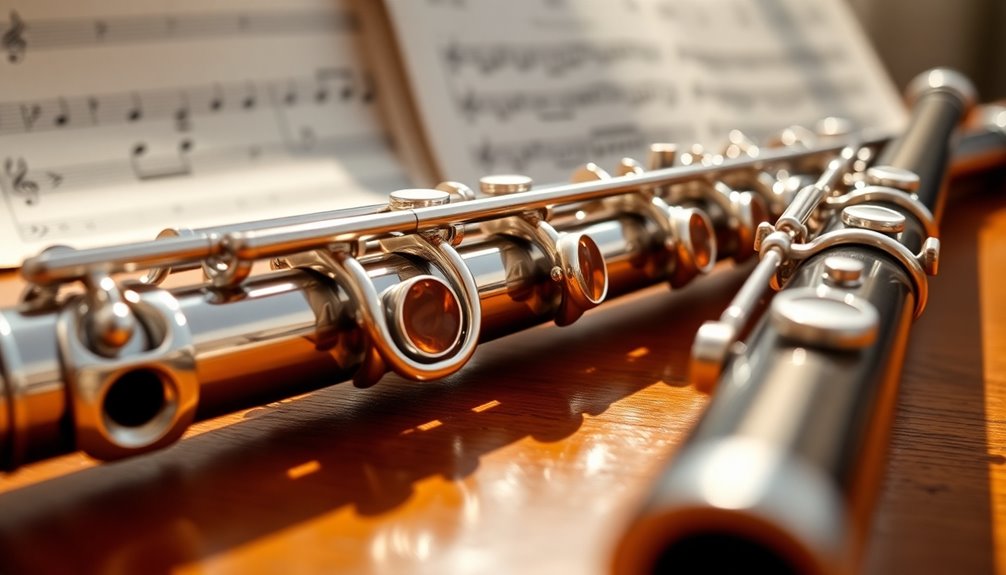
For those ready to take their flute playing to the next level, selecting an intermediate flute can make a significant difference in your musical expression and technique. At this stage, you'll want an instrument that not only enhances your sound but also supports your growing skills. The best brands in the intermediate flute market, like Yamaha, Jupiter, and Pearl, offer a variety of options that cater to aspiring musicians.
When choosing an intermediate flute, consider the materials used. Flutes made from solid silver or silver-plated nickel provide a richer tone and improved resonance compared to beginner models. Many of these flutes come with a closed hole design, which can help facilitate your shift from beginner to intermediate playing.
Additionally, some brands offer flutes with a B foot joint, which can expand your range and add versatility to your performances. Investing in a flute made from premium materials can greatly enhance your overall sound quality and durability.
It's also essential to test the flute before making a purchase. Pay attention to the response of the keys and the overall weight of the instrument. You'll want something that feels comfortable and balanced in your hands.
Don't hesitate to ask for recommendations or try multiple models to find the right fit for you.
Ultimately, investing in an intermediate flute can elevate your musical journey, allowing you to express yourself more fully. With the right instrument, you'll feel a sense of belonging in the flute community, as you connect with others who share your passion for music.
Professional Flutes Under Budget
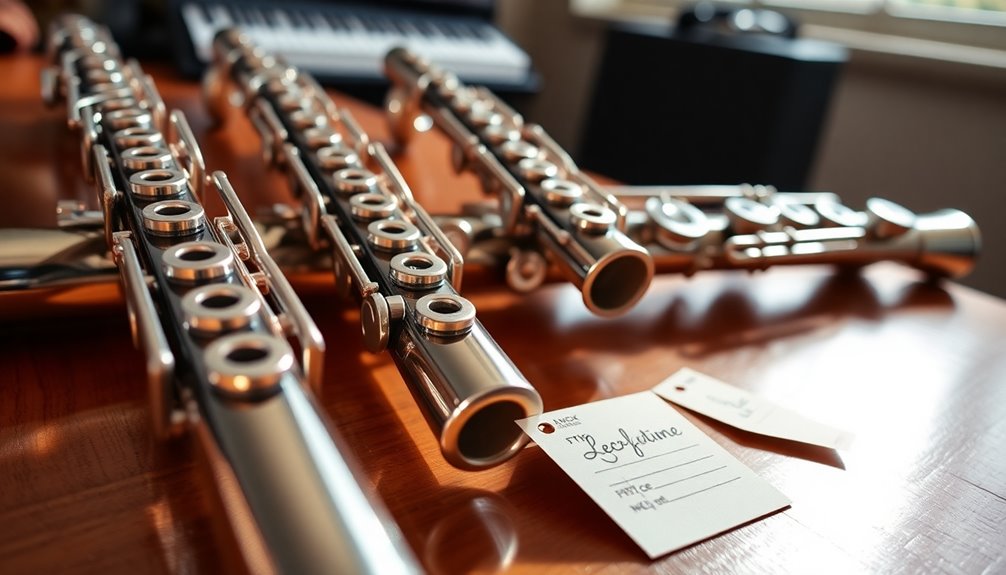
As you progress from intermediate to professional playing, you might be surprised to find that high-quality flutes don't always come with a hefty price tag.
There are plenty of budget-friendly options that can still deliver a professional sound, allowing you to refine your skills without breaking the bank.
Here are four remarkable choices to evaluate:
- Yamaha YFL-221: This flute offers a solid silver-plated body and headjoint, providing excellent intonation and a warm tone. It's an ideal choice for serious players who want quality without overspending.
- Jupiter JFL700: Known for its durability and rich sound, the JFL700 boasts a reputable build quality that can withstand the rigors of frequent use. It's perfect for those moving to a more advanced level.
- Gemeinhardt 2SP: With its silver-plated finish and open hole options, the 2SP is a favorite among many flutists. It delivers a bright, clear sound, making it suitable for various musical styles.
- Pearl 505: This model features a sleek design and a solid silver headjoint, allowing for a beautiful tonal quality. It's a popular choice for players seeking an affordable, yet professional-grade flute.
In addition, many top flutes for student musicians are available online, providing easy access to options that fit your budget.
Tips for Buying Used Flutes
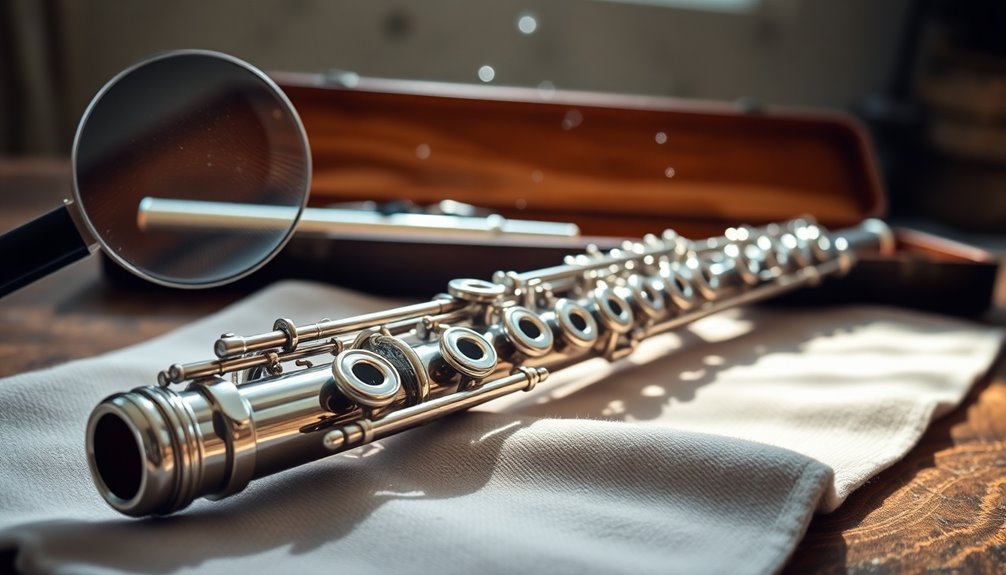
When you're considering a used flute, it's vital to approach the purchase with a discerning eye. First, evaluate the used flute conditions. Look for visible signs of wear, such as dents, scratches, or corrosion. These imperfections can affect the instrument's sound quality and playability. Ascertain that the pads are in good condition; replacing them can be costly and time-consuming.
Next, check the mechanism. Play the flute to test for any sticky keys or sluggish responses. A well-maintained flute should feel smooth and responsive. If possible, have a knowledgeable friend or a teacher assess the instrument with you. Their experience can provide invaluable insights.
Another important buying consideration is the brand and model. Research which brands are known for their durability and quality. Some brands hold their value better than others, and investing in a reputable name can benefit you in the long run. Consider looking into flutes made from nickel silver materials, as they are often recommended for beginners due to their durability.
Always inquire about the flute's history. Ask the seller why they're parting with it and how it has been maintained. A seller who can provide a detailed history often indicates a responsible previous ownership.
Lastly, don't hesitate to negotiate. Used flutes typically come with some wiggle room in pricing. Be respectful in your approach, and remember your budget.
With these tips in mind, you'll be well-prepared to find a used flute that not only fits your financial needs but also enhances your musical journey. Happy hunting!
Maintenance for Longevity
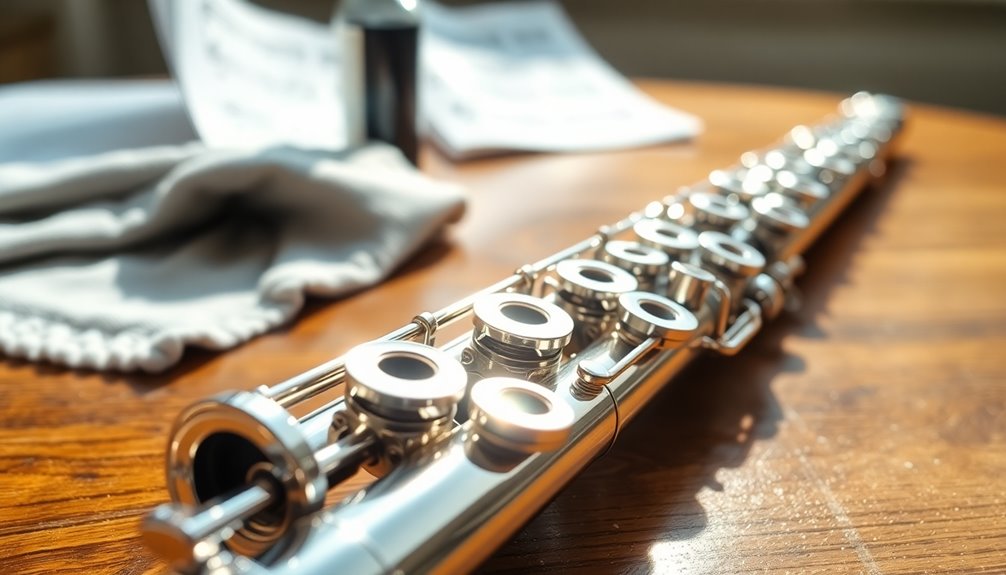
After selecting a used flute that meets your needs, maintaining it properly is key to ensuring its longevity and peak performance.
Regular maintenance not only enhances the sound quality but also protects your investment. Here are some essential cleaning techniques and pad care tips to keep your flute in top shape:
- Daily Cleaning: After each practice session, use a soft cloth or a cleaning rod with a microfiber cloth to wipe the interior. This removes moisture and prevents corrosion.
- Pad Care: Make sure to keep the pads dry. If they get wet, gently blot them with a clean cloth. Avoid pressing down on the keys excessively, which can compress the pads and affect their sealing.
- Regular Inspections: Periodically check for loose screws or misaligned parts. Tighten any loose screws gently, and if you notice any significant issues, consult a professional.
- Professional Servicing: Consider having your flute serviced by a technician every year or two. They can perform more in-depth maintenance, like adjusting the pads and springs, ensuring peak performance. Regular use of a flute cleaning kit can also help maintain the instrument's cleanliness and performance.
Resources for Flute Players
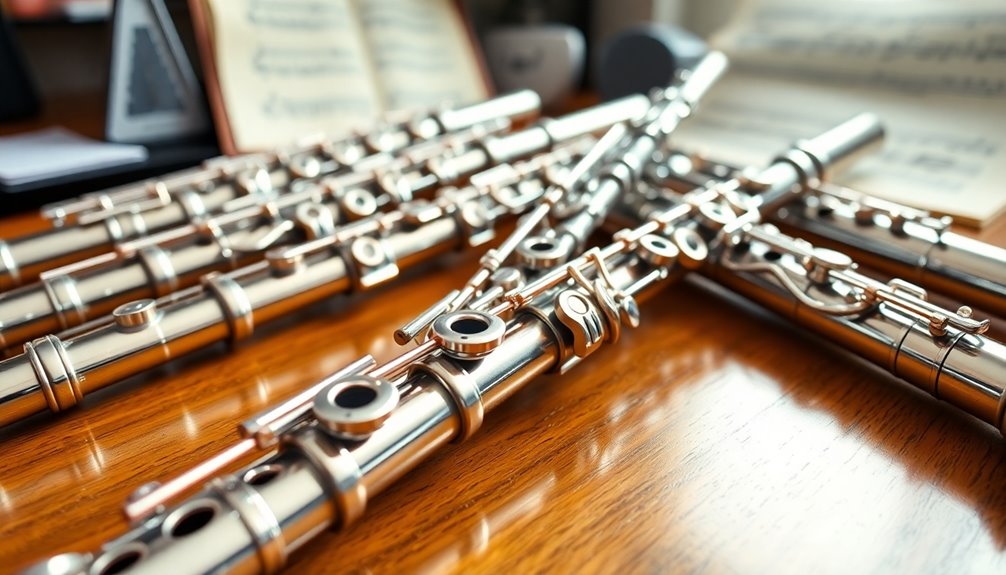
Finding the right resources can make a considerable difference in your journey as a flute player. Whether you're a beginner or an advanced musician, having access to the right materials is essential for your growth and enjoyment.
Start by exploring instructional books that focus on playing techniques. These texts not only teach you the basics but also provide valuable insights into advanced methods, helping you to refine your skills.
Online platforms are another excellent resource. Websites and forums dedicated to flute playing can connect you with fellow musicians, allowing you to share tips and ask questions. You might also find video tutorials that demonstrate specific techniques, making it easier for you to follow along and practice at your own pace.
Don't overlook the importance of flute accessories, either. Items like cleaning kits, metronomes, and tuning devices can enhance your practice sessions and overall performance. Investing in quality accessories will guarantee that your instrument stays in top shape while you focus on honing your sound. Additionally, consider using moisture control solutions to maintain consistent performance quality during practice.
Furthermore, consider joining a local flute choir or ensemble. Playing with others not only builds your confidence but also fosters a sense of community. You'll gain exposure to various styles and techniques, enriching your musical experience.
Incorporating these resources into your practice routine can greatly elevate your flute playing, making your journey not only productive but also fulfilling. Embrace these tools, and you'll find yourself growing as a musician in no time.
Frequently Asked Questions
How Do I Choose the Right Flute Size for My Child?
Choosing the right flute size for your child involves understanding flute sizing options and their specific needs.
Start by measuring your child's hand span; this will help determine if a standard or smaller flute is better. For beginners, consider a curved headjoint, as it's easier to manage.
Encourage your child to try out different flutes, ensuring they feel comfortable and confident.
Are There Specific Brands to Avoid When Buying Affordable Flutes?
When you're exploring affordable flutes, it's vital to be aware of common brand pitfalls. Some brands skimp on materials and craftsmanship, leading to poor sound quality and durability.
Take the time to do flute brand comparisons, focusing on customer reviews and expert opinions. Brands like Yamaha and Gemeinhardt are generally reliable, while others may not meet your expectations.
Trust your instincts, and remember, a good flute can inspire a lifelong musical journey!
Can I Find Flutes Made From Sustainable Materials?
You can absolutely find flutes made from sustainable materials! Imagine a flute crafted from bamboo, resonating beautifully as you play.
Many brands now offer eco-friendly options, prioritizing both sound quality and environmental responsibility. Look for instruments made from reclaimed wood or recycled metals, which not only sound great but also help reduce waste.
What Accessories Should I Consider When Purchasing a Flute?
When purchasing a flute, consider essential accessories for proper maintenance.
You'll need a cleaning rod and microfiber cloth for routine upkeep, along with a flute case to protect your instrument.
Don't overlook a cleaning snake for the inside of the tubing.
These flute maintenance tips help preserve your instrument's quality.
Investing in these supplies guarantees your flute stays in top shape, enhancing your playing experience and fostering your musical journey.
How Can I Tell if a Used Flute Needs Repairs?
To determine if a used flute needs repairs, start by inspecting it for signs of damage.
Look closely at the pads; if they're worn or leaking, it's a red flag.
Check for dents or misalignment in the keys, as these can affect playability.
Listen for any unusual sounds when you play.
Following some basic flute maintenance tips can help you spot issues early, ensuring your instrument stays in good condition for years.
Conclusion
In your quest for an affordable flute, remember that quality doesn't have to break the bank. With the right knowledge and resources, you can find an instrument that resonates with your musical aspirations. Isn't it time you embraced the joy of playing without the financial strain? By choosing wisely, you'll not only enhance your skills but also create beautiful music that inspires others. So, plunge into and discover the perfect flute that fits both your budget and your passion!

